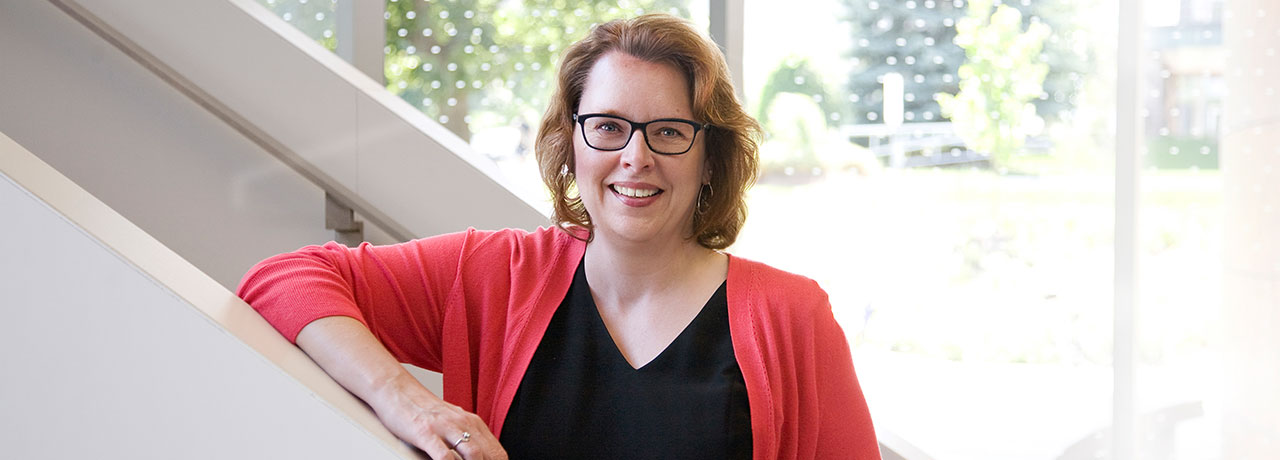
A vibrant work of textile art hangs on the wall in Deborah MacLatchy’s office. Patches of fabric are carefully positioned and sewn together, balancing size, colour and texture. Together, the individual elements create a harmonious whole.
The piece is similar to how Wilfrid Laurier University’s new president and vice-chancellor views the Laurier community — a composition of students, faculty, staff, alumni, donors and partners, all distinct but united in forming a dynamic university.
“Laurier is experiencing real momentum,” says MacLatchy. “Our trajectory is future-focused and we are building on our strengths.”
Those strengths, many would say, include a newly installed president whose career and life experience position her well to lead a university that’s focused on academic excellence, research growth and student experience.
Born into a family of educators in Wolfville, Nova Scotia, MacLatchy comes by her passion for education honestly. Her father, Cyrus, a physics professor at Acadia University, and her mother, Ann, a special education teacher, encouraged all three of their daughters to study a broad range of subjects.
As a child growing up on the shores of the Minas Basin and the nearby Bay of Fundy, MacLatchy soaked up the area’s rich history and developed a love for water and a fascination with aquatic life. While completing an honours bachelor of science at Acadia, she worked as a lifeguard and taught swimming at the university pool. She also spent hundreds of hours tromping across mudflats to collect water and invertebrate samples for her course work.
An interest in endocrinology — the study of glands and hormones — led her to do graduate work at the University of Manitoba, where she earned a PhD in zoology. It was in Manitoba that MacLatchy met her life partner, Bill Campbell. Over the next few years they made a series of moves together as MacLatchy’s career took her first to the University of Guelph for postdoctoral work and later to the University of New Brunswick, where she accepted a tenure-track professorship.
At UNB, MacLatchy excelled at research and teaching, but she also demonstrated an aptitude for administrative work. She served as director of the university’s international office and was later appointed dean of science, applied science and engineering. In 2007, she made another move, accepting the position of dean of science at Laurier.
“I was attracted to Laurier because the university was searching for a dean who would continue to develop a Faculty of Science that maintained its focus on undergraduate teaching excellence while also building its graduate programs and research impact,” MacLatchy says. “It was an opportunity to participate in building a much more influential Faculty of Science on the national scene.”
MacLatchy excelled in the dean’s role. Two years later, she was appointed vice-president: academic and provost.
Over the years, MacLatchy has played a lead role in many significant initiatives at Laurier — the development of a new strategic academic plan, the creation of a multi-campus governance framework, the launch of the Laurier Institute for Water Science, the start of the Laurier Centre for Women in Science, the creation and expansion of the Office of Indigenous Initiatives, the development of a new institutional budget model, and many others.
“We are fortunate that someone who is not only passionate about learning, but also about university leadership, has taken on the presidential role at such a pivotal time in our history,” says Laurier Chancellor Eileen Mercier. “It is clear that Deborah has been preparing for this new and important role not only during her years at Laurier but throughout her teaching and research career.”
In addition to her work as a senior administrator, MacLatchy has remained an active researcher and graduate-student supervisor. Her passion for research and the enjoyment she derives from working with students both run deep.
“My mentorship of undergraduate and graduate students, as well as postdoctoral fellows, has been one of the most rewarding aspects of my career,” MacLatchy says. “I am thrilled to have played a small part in helping them grow into the amazing scientists many of them have become.”
Her students have been guided by a mentor who is a remarkable scientist herself. MacLatchy has published more than 80 peer-reviewed publications; she is funded by the Natural Sciences and Engineering Research Council of Canada and through industry and federal, provincial and territorial grants; she is a founding fellow and past-chair of the science directors of the Canadian Rivers Institute; she is a past-president and council member of the Canadian Society of Zoologists; she is co-lead of the ecotoxicology node of the Southern Ontario Water Consortium; and, in 2005, she received a prestigious NSERC Synergy Award for Innovation to recognize the success of her industrial and government partnerships to remediate the environmental effects of pulp-mill effluents.
She was also recognized with an honorary doctorate from Acadia University in 2016; received the 2015 Recognition Award from the Senior Women Academic Administrators of Canada; and in 2012 was named one of Canada’s Most Powerful Women by the Women’s Executive Network.
“Dr. MacLatchy serving as president represents an exciting time for the Laurier community,” says John Bowey, past chair of Laurier’s Board of Governors and chair of the presidential search committee that unanimously recommended her appointment. “Her outstanding accomplishments as a scientist coupled with her exemplary administrative experience will serve Laurier well as the university continues to increase its research capacity and grow its reputation as a research leader.”
In October, Maclean’s magazine ranked Laurier No. 1 in its category for student satisfaction in the publication’s annual rankings of Canadian universities. It was the second consecutive year Laurier earned top position in the category. Maintaining an outstanding student experience is high on MacLatchy’s agenda as president and vice-chancellor.
“How students experience Laurier in totality is ultimately what sets Laurier apart,” she says. “That we have experienced tremendous growth while being chosen No. 1 by our students in the student satisfaction category among Canadian comprehensive universities speaks to the effort of our faculty, staff and organizational partners to keep the holistic development of students foremost in our priorities.”

MacLatchy knows first-hand that learning doesn’t just take place in a classroom. It also happens when students participate in research, work placements, field courses, community service-learning courses, study abroad programs and other “experiential learning” opportunities.
“Laurier will continue to be on the forefront of best practices when merging traditional classroom learning and experiential learning that builds transferrable skills and leadership qualities,” she says.
MacLatchy says one of the greatest challenges an institution can face is staying true to its values and core mission while setting collective goals. She sees keeping student satisfaction at the forefront of planning for a proposed new Laurier site in Milton as key to the university’s future.
“It is an absolute priority that we do this right, including ensuring the student experience and academic programs in Milton are second to none,” she says. “Building our Milton site while also supporting the aspirations of our Waterloo, Brantford, Kitchener and Toronto locations will take commitment from the entire university.”
Laurier Vice-President of Student Affairs David McMurray has worked closely with MacLatchy during the past 10 years. He says the university community is lucky to have a personable and approachable president who makes students her top priority.
“She’s a champion for students, and places great value on academic success and achievement,” McMurray says. “She wants students to be the best they can be and she really understands the benefits of focusing on holistic education both inside and outside the classroom.”
Another priority is diversity and equity. In particular, MacLatchy is keen to ensure that the university responds to the recommendations of the Truth and Reconciliation Commission of Canada and works toward integrating Indigenous ways of knowing and Indigenous curriculum into courses and programs across the university.
“I want to ensure we are creating welcoming campus environments that reflect all of the communities that Laurier serves,” she says.
Looking forward, MacLatchy plans to initiate a consultative process that encourages the university’s key stakeholders — including students, faculty, staff and alumni — to discuss their vision for Laurier’s future.
“What my 10 years at Laurier have taught me more than anything is to be a better listener than talker,” MacLatchy says. “Reaffirming and potentially evolving our vision, mission and values will position us for the development of a strategic plan to prioritize collective goals. I’m looking forward to having those conversations across the university.”
Those conversations will help MacLatchy as she helps to further weave the pieces of Laurier’s fabric together, strengthening the overall community, enhancing the university’s reputation and fostering pride among its students, faculty, staff and alumni.
“There is enormous pride in, and goodwill toward, the institution that is Laurier,” MacLatchy says. “People who are here as students and employees, or are alumni of the university, want to be successful and make the institution successful through their accomplishments.”